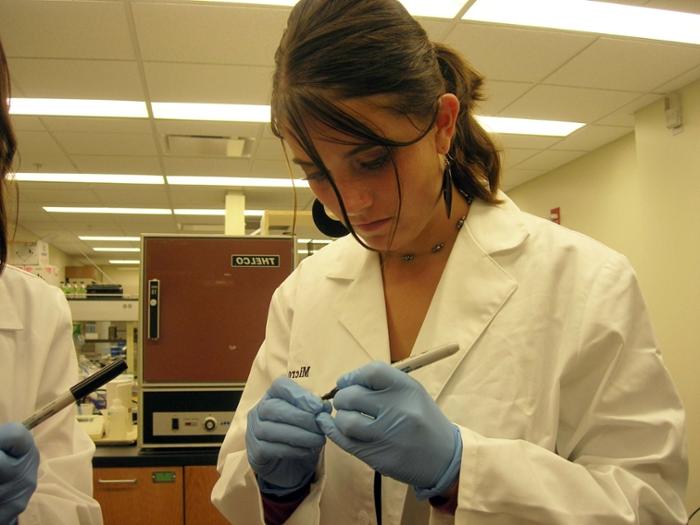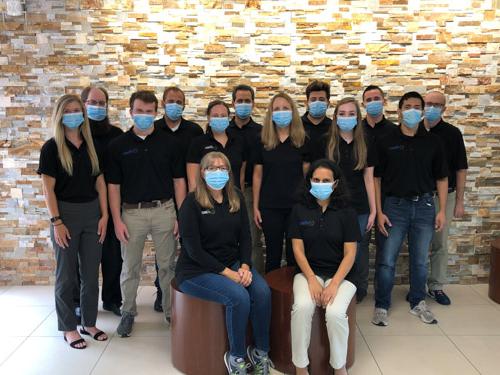NE-INBRE Scholars Program
What is INBRE?
INBRE (IDeA Network of Biomedical Research Excellence) is a project supported by the National Institute of Health (IDeA is from Institutional Development Award). The primary focus of INBRE is to enhance the competitiveness of biomedical research in Nebraska by supporting the training of students and the research efforts of faculty.
Who is involved?
The grant is housed at the University of Nebraska Medical Center. There are three Ph.D. training campuses: University of Nebraska-Lincoln, University of Nebraska Medical Center, and Creighton University Medical Center.
 Biology and Chemistry are currently the only departments at 体育菠菜大平台 that provide an opportunity to be in this scholar program.
Biology and Chemistry are currently the only departments at 体育菠菜大平台 that provide an opportunity to be in this scholar program.
Other Undergraduate institutions are: University of Nebraska at Omaha (Biology), Wayne State College, Doane College, Creighton University, Chadron State College, University of Nebraska-Lincoln, College of Saint Mary, and Nebraska Wesleyan University.
Learn more about NE-INBRE via the UNMC website
INBRE benefits
Financial support is provided for these undergraduates throughout their tenure as INBRE Scholars. Students are also given opportunities to attend national meetings and conferences. With the end result of the scholars program being to recruit students to graduate programs at Ph.D. granting institutions. Once a scholar has been admitted to a Ph.D. program, the INBRE project will provide support for the first year of graduate studies.
INBRE supported faculty at 体育菠菜大平台:

Kimberly Carlson: carlsonka1@xyschool.net
Kristy Kounovsky-Shafer: kounovskykl@xyschool.net
Austin Nuxoll: nuxollas@xyschool.net
Joe Dolence: dolencejj@xyschool.net
Mike Moxley: moxleyma@xyschool.net
Yipeng Sui: suiy@xyschool.net
For more information about the program, feel free to contact Dr. Kristy Kounovsky-Shafer.
Download the 2025 体育菠菜大平台 INBRE (BRIN) APPLICATION
体育菠菜大平台 INBRE (BRIN) scholars
|
|
2024 |
|
|
Chayton Kumpost
Nate Lilla
Caleb Rother
Jade Salgado
|
| 2023 |
2022 |
2021 |
|
Sunayn Cheku
Marissa Hoover
Naara Ramirez
Belle Turk
Noah Shackelford
|
Mariam Escobar Garcia
Alethia Henderson
Esmeralda Mendez-Ortiz
|
Nathan Fancher
Sarah Chandler
Charles Polen
|
|
2020
|
2019
|
2018
|
|
Joe Keele
Sam Mercer
|
Josh Lindenberger
Sydney Keckler
Samantha Rau
Wuilian Martinez
|
Amanda Macke
Justine Pitzer
Morgan Lee
|
|
2017
|
2016
|
2015
|
|
Molly Kohlbek
Makayla Nemecek
Carmen Pavlik
|
Aatiya Ahmad
Keegan McGill
Cody Masters
|
Nate Harms
Alexis Page
Dawson Johnson
|
| 2013 |
2012 |
2011 |
|
Madelyn Warren
Shanice Harris
Loany Fajardo
|
Tia Hadley
Derek Kleier
|
Ben White
Jaicee Post
Michele Stretch
|
| 2010 |
2009 |
2008 |
|
Andrew Prososki
Travis Kirchner
Jeff Shaw
|
Brandon Mizner
Marcelle Strydom
|
Becky Fusby
Andrew Block
Katie Langenfeld
|
| 2007 |
2006 |
2005 |
|
Christine Gilling
Austin Nuxoll
Robert Daro
|
Kylee Gardner
Ashley Stillwell
|
Joseph Chiweshe
Mary Connealy
Sarah Marshall
Anjeza Pashaj
|
| 2004 |
2003 |
2002 |
|
Lindsay Vivian
Michael Kling
Cory Ciccone
|
Kay Crabtree
Cole Spressor
Karynn Kucera
|
Melissa Fladseth
Lisa Walters
Raymond Baillou
|
| |
|
|
Resulting scholar publications in refereed journals (* designates scholar)
-
Rau, S.*, Huynh, T., Larsen, A., Kounovsky-Shafer, K.L., Concentration of lambda concatemers using a 3D printed device. Electrophoresis 44: 744-751, 2023.
- Rokusek, B.S., Cheku, S.*, Rokusek, M., Waples, C.J., Harshman, L., and Carlson, K.A. HoTDAM! An easy-to-use automated assay expands the inducible thermotolerance phenotype in Drosophila melanogaster: heat hardening reduces motility. Comparative Biochemistry and Physiology Part A: Molecular and Integrative Physiology 286:111522, 2023. http://doi.org/10.1016/j.cbpa.2023.111522
- Menke, B., Rau, S.*, Ripp, A., Kounovsky-Shafer, K.L., Determining the effective electrophoretic mobility of fluorescently labeled microspheres in microchannels in a dynamic range of ionic strength conditions. Journal of Analytical and Bioanalytical Techniques 12 (2): 427, 2021.
- Schissel (Nemecek), M.*, Best, R., Liesemeyer, S., Tan, Y-D., Carlson, D.J., Shaffer, J.J., Avuthu, N., Guda, C., and Carlson, K.A. Effect of Nora virus infection on native gut bacterial communities of Drosophila melanogaster. AIMS Microbiology 7(2): 216-237, 2021.
- Macke, A.*, Lopez, W., Carlson, D.J., and Carlson, K.A. Nora virus VP4b and ORF1 circulate in hemolymph of infected D. melanogaster with coordinate expression of vago and vir-1. Vaccines 8(3), 2020.
- Everitt, K.R., Schmitz, H.C., Macke A.*, Shan, J., Jang, E., Luedtke, B., Carlson, K.A., and Cao, H. Investigation of a sensing strategy based on a nucleophilic addition reaction for quantitative detection of bisulfite (HSO3-). Journal of Fluorescence 30: 977-983, 2020.
- Saleem, M., Pervaiz, Z., Contreras, J., Lindeneberger, J.*, Hupp, B., Chen, D., Zhang, Q., Wang, C., Iqbal, J., and Twigg, P. Cover crop diversity improves multiple soil properties via altering root architectural traits. Rhizosphere, 2020. http://doi.org/10.1016/j.rhisph.2020.100248
- Houtwed, H.A., Xie, M. Ahmad, A., Masters, C.D.*, Davison, M.M., Kounovsky-Shafer, K., and Cao, H. Analysis of bisulfite via a nitro derivative of cyanine-3 (NCy3) in the microfluidic channel. Journal of Fluorescence 29: 523-529, 2019.
- Masters, C.*, Dolphin, J., Maschmann, A., McGill, K., Moore, M., Thompson, D., and Kounovsky-Shafer, K.L.. Development of 3D printed mesofluidic devices to elute and concentrate DNA. Electrophoresis 40: 810-816, 2019.
- Maschmann, A., Masters, C.*, Davison, M., Lallman, J., Thompson, D., and Kounovsky-Shafer, K.L. Determining if DNA stained with a dye from the TOTO-1 family can be digested with restriction enzymes. JOVE 132, 2018.
- Wilfredo, L., Page, A.M.*, Carlson, D.J., Ericson, B.L., Cserhati, M.F., Guda, C., and Carlson, K.A. Analysis of immune-related genes during nora virus infection of Drosophila melanogaster using next generation sequencing. AIMS Microbiology 4(1):123-139. 2018.
- Kim, Gunwoo, Jang, Eunju, Page, Alexis M.*, Ding, Ting, Carlson, Kimberly A., Cao, Haishi. Investigation of a sensing approach based on a rapid reduction of azide to selectively measure bioavailability of H2S. RSC Adv. 6:95920-95924, 2016.
- Carlson, Kimberly A., Gardner, Kylee*, Pashaj, Anjeza*, Carlson, Darby J., Yu, F., Eudy, Jim D., Zhang, C., Harshman, Larry G. Genome-wide gene expression in relation to age in large laboratory cohorts of Drosophila melanogaster. Genetics Research International Epub May 21, 2015.
- Gilling, Christine E.* and Carlson, Kimberly A. The effect of OTK18 upregulation in U937 cells on neuronal survival. In Vitro Cell Dev Biol Anim 45(5-6): 243-51, 2009.
- Carlson, Darby J., Pashaj, Anjeza*, Gardner, Kylee*, and Carlson, Kimberly A. Advances in age old questions. Fly 3(2): 149-151, 2008.
- Larson, Stephanie, Gilling, Christine E.*, and Carlson, Kimberly A. A proposed mechanism for OTK18 regulation of TNF-α in response to neurotoxic insult. J Biol, Biol Syst, Bioinform 2(1), 2008.
- Spresser, Cole R.*, Marshall, Sarah E.*, Carlson, Kimberly A. OTK18: A transcriptional suppressor and putative anti-retroviral molecule with a potential role in regulation of innate immunity. J Genet 87: 109-117, 2008.
- Steele, Janet E., Kucera, Karynn E.*, Ciccone, Cory A.*, Connealy, Mary E.* Exercise and diabetes influence antioxidant activity and gene expression in female rats. Trans NE Acad Sci 31: 51-60, 2008.
- Vogel, J., Gu, Y., Twigg, P., Lazo, G., Laudencia-Chingcuanco, D., Hayden, D. M., Donze, T. J., Vivian, L. A.*, Stamova B., Coleman-Der D. EST sequencing and phylogenetic analysis of the model grass Brachypodium distachyon. Theor. Appl. Genet. 113: 186-195, 2006.
- Spresser, Cole R.*, Carlson, Kimberly A. Utilization of Drosophila melanogaster for studies of HIV-1 infection. J Neurosci Res 80: 451-5, 2005.
 New breakthroughs
New breakthroughs The power of imagination
The power of imagination Rich tradition. Bright future.
Rich tradition. Bright future. Taking care of business
Taking care of business

 Biology and Chemistry are currently the only departments at
Biology and Chemistry are currently the only departments at 







